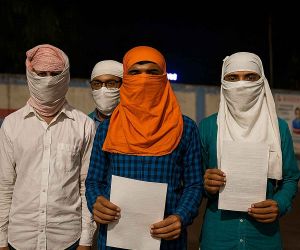MORE COVERAGE
Twitter Coverage
Satyaagrah
Written on
Satyaagrah
Written on
Satyaagrah
Written on
Satyaagrah
Written on
Satyaagrah
Written on
JOIN SATYAAGRAH SOCIAL MEDIA
"World of reality has its limits; world of imagination is boundless": Draw red lines - Time for Modi government to strongly call the German bluff on Kashmir, India slammed Germany for its 'unwarranted advice', says its 'injustice to terror victims' of J&K

German Foreign Minister Annalena Baerbock’s statement that Germany has a “role and responsibility” with regard to the situation in Kashmir and supports “intensively” UN intervention to find a peaceful solution”, is objectionable on many counts.
|
India has always rejected any third-party intervention in the Jammu and Kashmir issue, which has to be settled bilaterally between India and Pakistan as per the 1972 Simla Agreement. India, given its past experience, is particularly allergic to any UN intervention. The German Foreign Office would not be unaware of India’s ire when the Kashmir issue was sought to be raised at Pakistan’s behest by China in the UN Security Council in August 2020 after many decades. Doesn’t Germany realize that India will see its position as one of promoting a joint Pakistan-China strategy to involve the UN?
Pakistan’s Foreign Minister Bilawal Bhutto Zardari in the joint press conference predictably called for a resolution of the Kashmir issue in accordance with UN resolutions, repeating a line that Pakistan’s leadership has been unrealistically taking. The German Foreign Office would have known that Bhutto would reiterate this position and, accordingly, must have briefed Baerbock on the line she should take. That she endorsed Bhutto’s position shows that beyond her own inadequacies, the German Foreign Office’s brief leaned towards Pakistan’s position. With more diplomatic wisdom and understanding of the stakes Germany has in ties with India, she could easily have skirted the issue by simply calling for a constructive dialogue between India and Pakistan to resolve the issue peacefully, or some such formulation that appeared neutral.
|
Surprisingly, Baerbock has gone beyond the position the US now takes on Kashmir, which is to encourage both sides to resolve the issue bilaterally through dialogue, with a readiness to assist if both sides wanted it. The earlier formulation “in accordance with the wishes of the people of Kashmir” which was an indirect reference to “self-determination” has been omitted of late. The US, or for that matter the UK, does not openly assume a “role and responsibility” to intervene in the Kashmir issue, though the British do refer to the “wishes of the Kashmiri people”. No other European country, or the EU, is claiming any “role or responsibility” in settling the Kashmir issue. France does not meddle at all. Why Germany is assuming a “role and responsibility” in resolving the Kashmir issue which neither India and the UN nor the EU has burdened it with is not understandable in the context of the larger importance of India-German ties.
Baerbock is a political recidivist. Already in June this year during her visit to Pakistan (the first to our region) in her joint press conference with Bhutto, while calling for a constructive approach from both sides to improve relations she asserted that the UN had a role to play in ensuring human rights in Kashmir, mentioning also that while Germany was not a member of the UN Security Council, it offered its support within bodies such as UNHRC and others. She seemed to be implicitly critical of India’s retaliatory strikes against Pakistan, stating that even if there is a provocation, it is a strength of different governments that “one doesn’t react” but “stands on its own principles and to international principles”.
|
In July the German Foreign Office spokesperson, in another case of interfering in India’s internal affairs, made an inordinately long comment on the arrest of Muhammad Zubair, saying that the German embassy in New Delhi was “monitoring” the cases against him “very closely”. He underlined that the importance of press freedom also applied to India, and patronizingly admonished India by expounding that “India describes itself as the world’s largest democracy. So one can expect democratic values like freedom of expression and of the press to be given the necessary space there”. He added that Germany was in contact with its European Union partners about the action against the journalist suggesting that Germany was taking the lead in Europe to hold India to account. He gave lessons to India in pontificating further that “free reporting is beneficial to any society — and restrictions are a cause of concern”. Deutsche Welle is, as we have seen, carrying on a campaign against India under its chief international editor Richard Walker.
In June and now in October, Baerbock, despite her pretensions of being a crusader for human rights, made no mention of terrorism, which is an egregious onslaught on human rights. Germany itself has suffered from Islamic terrorism. Rather than balancing her statements by a reference — even in the context of the FATF — to the need to eliminate terrorism from our region which constituted an obstacle to peace and violated the human rights of innocent people, she did not utter the word on the subject. And this is on the soil of a country that is the epicenter of terrorism, one that hosted Osama bin Laden and the Taliban.
While her desire to obtain Pakistan’s cooperation in facilitating the travel of a few thousand Afghan refugees to Germany is understandable, the degree of her ingratiating attitude towards Bhutto, knowing well that it is Pakistan that facilitated the takeover of Afghanistan by Pakistan, seemed self-demeaning. That she believes that Germany’s stakes in accepting Afghan refugees outweigh the stakes in ties with India shows disorientation in the German foreign policy under the present coalition government.
India is right in ticking off the German Foreign Minister for her provocative posturing against India. She was essentially signing off on Pakistan’s position, giving Islamabad respectability and some diplomatic brownie points. India’s objections to her remarks in Berlin in Bhutto’s company were essentially confined to her failure to address the issue of terrorism that Pakistan has inflicted on the Kashmiris. India could have gone beyond that and specifically asked Germany to not meddle in India’s internal affairs or seek to violate its territorial sovereignty. A stronger reaction would have got registered more deeply on EU countries in general on what our tolerance limits are.
There is speculation that Germany is reflecting its unhappiness with our position on the Ukraine crisis and our refusal to condemn Russia. The German PR to the UN has apparently been abrasive with our PR on our neutral position on the Ukraine conflict. The visit of the US ambassador to Pakistan-occupied Kashmir and describing it as AJK (Free Jammu and Kashmir) is being interpreted similarly. This does not stand to reason. We have not criticized Germany and the US for their role in the genesis of the Ukraine crisis or their arms supplies to Ukraine that inevitably prolongs the conflict and impose costs on third countries. India may not have condemned Russia, but it has not supported it either. If we have not taken a position critical of German policies on the Russia-Ukraine conflict despite the bitter legacies of World War 2, why should Germany think it is right to disregard our territorial and security interests, hit at us on democracy issues, and interfere in our internal matters?
Some plain speaking on our part is required to prevent a Germany in disarray in Europe causing a drift in our bilateral ties. If Germany now has a more active Indo-Pacific policy and is becoming more critical of China, there is a case for stronger understanding between our two countries. This points to the need to avoid needless provocations against India, especially as bilateral economic prospects are very positive with India’s economic rise and the likely disruptions in Germany’s economic ties, as well as those of Europe, with China.
References:
 Support Us
Support Us
Satyagraha was born from the heart of our land, with an undying aim to unveil the true essence of Bharat. It seeks to illuminate the hidden tales of our valiant freedom fighters and the rich chronicles that haven't yet sung their complete melody in the mainstream.
While platforms like NDTV and 'The Wire' effortlessly garner funds under the banner of safeguarding democracy, we at Satyagraha walk a different path. Our strength and resonance come from you. In this journey to weave a stronger Bharat, every little contribution amplifies our voice. Let's come together, contribute as you can, and champion the true spirit of our nation.
 |  |  |
| ICICI Bank of Satyaagrah | Razorpay Bank of Satyaagrah | PayPal Bank of Satyaagrah - For International Payments |
If all above doesn't work, then try the LINK below:
Please share the article on other platforms
DISCLAIMER: The author is solely responsible for the views expressed in this article. The author carries the responsibility for citing and/or licensing of images utilized within the text. The website also frequently uses non-commercial images for representational purposes only in line with the article. We are not responsible for the authenticity of such images. If some images have a copyright issue, we request the person/entity to contact us at This email address is being protected from spambots. You need JavaScript enabled to view it. and we will take the necessary actions to resolve the issue.
Related Articles
- "Turning the page from turmoil to tranquility": 4 years since the revocation of Article 370, Jammu & Kashmir emerges from the shadow of conflict, embracing peace, prosperity and an era of unprecedented development, this is the dawn of a new, united Bharat
- Ladakh: Bus driver Ahmed Shah jumped off the bus seconds before it fell into the river killing 7 Indian Army soldiers and injuring 19, FIR filed: Happened days after Yasin Malik get life imprisonment
- "Truth finds its way, no matter the shadows": In a first, senior IPS officer Basant Kumar Rath's controversial stint in Jammu & Kashmir reaches an abrupt end, his early retirement expose a complex web of intrigue and alleged misconduct in the force
- Mirwaiz Farooq's surprising release by BJP Govt sparks intense speculation and shifts in Kashmiri politics, as he navigates his renewed freedom, the cleric-politician's leadership will be tested amid evolving political scenarios and forthcoming elections
- Terrorist Commander of proscribed terror outfit Hizbul Mujahideen Nisar Khanday killed, incriminating materials, arms and ammunition including one AK 47 rifle recovered: Operation in progress
- Two Lashkar-e-Taiba terrorists sent to '72 hoors' in an encounter in Jammu & Kashmir: Jan Mohd Lone who killed bank manager Vijay Kumar eliminated by security forces, killer of school teacher Rajni Bala trapped by security forces
- Hindu student @ NIT Srinagar booked for ‘blasphemy’ over Prophet video, to no surprise, the Islamists invoked their favourite slogan, "Sar Tan Se Juda", calling for the slaughter of Hindu student because he shared an old video critical of Prophet Muhammad
- The ‘Sanghi propaganda’ trope on abduction and conversion of Sikh girls to Islam. Here is how this online tirade is an omen of impending danger
- "Ayaz Akbar dosen't like jail, they got the wrong kind of bars in there": Properties of Mohammad Akbar Khanday, popularly known as Ayaz Akbar who was and the spokesman of the Hurriyat Conference, attached by NIA in the Kashmir terror funding case of 2017
- Kashmiri separatist Yasin Malik awarded two life imprisonment sentences, 10 years of rigorous imprisonment for 10 offences and Rs 10 lakhs financial penalty by Special NIA court for terror funding activities in Jammu and Kashmir
- Mudassir Ahmad Sheikh, martyr of J&K police killed three Pakistani terrorists of Jaish-e-Mohammad (JeM) before laying his life for Nation in Baramulla encounter: Father of braveheart proud of his son who sacrificed his life for Tirangaa
- 'Hinduon se Azadi', 'La ilaha illallah' and 'Ghazwa-e-Hind' slogans by Muslims was secular leading to Genocide of Kashmiri Pandit: Then and now, from Azadi slogans to Hindu hate, the nature of Jihad and its apologists remain unchanged
- "गुस्ताख़ बे अदब": Oops! The City Council of Cologne succumbs to the pressure of Turkish Muslim migrants; Goodbye, Armenian Genocide memorial; Welcome, new dance routine – the 'Diversity Waltz,' while History takes a backseat in this cultural shuffle!
- "To reopen old wounds is to seek healing, not hurt": 34 years past the assassination of Judge Neelkanth Ganjoo for fulfilling his duty still echoes in Jammu and Kashmir, as the SIA reopens this chapter, we are reminded that justice always finds its way
- "As dreams meet destiny, the world watches with bated breath": Srinagar beams under the global spotlight as the enchanting Kashmir readies for Miss World 2023, 'Mind-blowing' echoes Karolina Bielawska, encapsulating the valley's mesmerizing allure

























